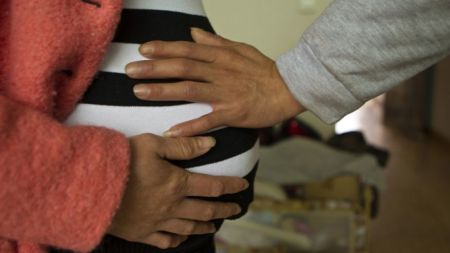Supreme Court Sides With Conservative and Liberal Women's Groups in UPS Pregnancy Discrimination Case

The U.S. Supreme Court voted 6-3 on Wednesday to side with a former UPS delivery driver who says she was discriminated against when she become pregnant but was not given special accommodation. The woman's case has been supported both by conservative and liberal women's groups, who filed separate briefs in the case.
"This is long overdue," said employment law expert David Gregory, according to AFP.
"The Supreme Court has finally recognized that pregnant workers are not second- or third-class citizens consigned to the periphery of the law. Instead, the Supreme Court has insightfully realized that pregnant workers run the full gamut -- from disabling conditions early on in pregnancy to those who are able to work up until the day of delivery."
The Supreme Court's decision reverses an earlier ruling by an appellate court.
The case concerns plaintiff Peggy Young, who says that in 2006 she was the victim of discrimination when she asked but was denied a change in her working conditions after becoming pregnant through in vitro fertilization.
Young's doctors had told her to avoid carrying parcels heavier than 20 pounds, but UPS refused to alter Young's workload, arguing that a position in charge of "light" packages" is only reserved for employees with disabilities or injuries.
This forced Young to take seven months of unpaid leave, which made her forfeit her health insurance.
Justice Stephen Breyer said in the majority statement that the employer "may seek to justify its refusal to accommodate the plaintiff by relying on legitimate, nondiscriminatory, nonpretextual justification for denying accommodation."
The court added that Young had shown that she belongs to a protected class that sought accommodation, but her employer had failed to provide it.
Law professors and women's rights organizations had said in an amicus brief in May 2014: "The vast majority of working women will become pregnant at some point during their working lives and many of them will experience at least minor conflicts between job requirements or working conditions and the temporary, but real physical effects of pregnancy."
Pro-life groups added in a separate statement in September 2014 that enforcing the Pregnancy Discrimination Act would help relieve some of the pressure felt by women to undergo an abortion.
"Economic pressure is a significant factor in many women's decision to choose abortion over childbirth," the pro-life groups said. "The PDA protects the unborn child as well as the working mother who faces economic and other difficulties in bearing and raising the child."
CNN analyst Steve Vladeck, who is a law professor at American University, said that the ruling represents an "important victory" for pregnant employees like Young.
"The lower court had made it exceedingly difficult for such plaintiffs to show that their employer had unlawfully refused to make accommodations for them because of their pregnancy, but Justice Breyer's opinion should make it easier at least to present such claims to a jury — if not to prevail on them outright," Vladeck said.






















